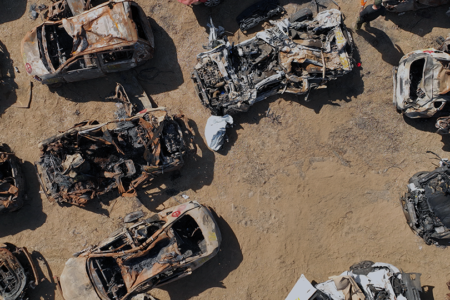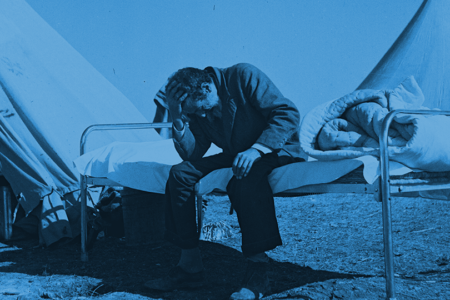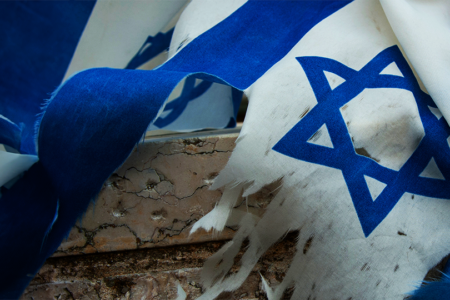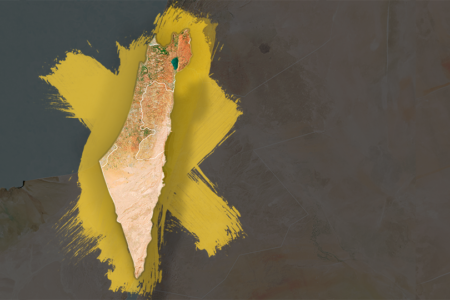A Talk with the General
“I remember being in my tank on the way from Jenin to the Jordan. It was Wednesday afternoon at four o’clock. I was resting, drinking some water, when someone opened the wireless. Suddenly I heard the broadcaster quoting from the Psalms. He was saying, Our feet shall stand within thy gates O Jerusalem.’ After the reading was finished, the commentator continued, ‘Our first soldiers have arrived at the Wall. Old Jerusalem is ours!’ I looked at my commander, who was a non-religious Jew, and saw that tears were flowing into his eyes. We already knew that the Old City was in our hands. But just to hear him say that the Wailing Wall was ours, brought such a flood of happiness…”
With these words Yigal Klein adds his voice to those of Jews the world over who carry etched on their memories the precise details of what they were doing when the news of the reunification of Jerusalem came to them. Historically, for the Jews, it must stand as the surpassing single event of the past two thousand years. The foot-weary sons of Abraham had turned longing, and often red rimmed eyes toward the Old City over all of the labored years of the Dispersion. To possess the City of David was the passionate obsession of successive generations of Jews. The thought of one day occupying the Temple Mount and standing again before the giant ashen blocks of the Western Wali had kept spiritual hope flowing through the anatomy of the scattered Nation.
On June 7,1967, at 9:50 in the morning, Jewish paratroopers were standing on the hallowed Temple Mount. Colonel Modechai “Motta” Gur, brigade commander, radioed the electrifying news: “The Temple Mount is ours. Repeat: the Temple Mount is ours.” Within minutes another young soldier was shouting to his charging comrades, “The Western Wall! I can see the Wall.”’ The Star of David would soon snap in the breeze above the heads of weeping sons of Zion as they kissed the ancient Wall which had been the enduring symbol of Jewish expectancy of one day repossessing beloved Jerusalem.
The recipient of Gur’s message from the Temple Mount was Brigadier-General Uzi Narkiss, the Israeli Central Commander. He had directed the attack, and would subsequently be afforded a unique niche in Jewish history. He would be the man most directly responsible for the reunification of Jerusalem.
Ironically, Uzi Narkiss had been here before. It was in 1948 as a twenty-three year old commander of Palmach forces during the War of Independence. The vaunted Arab Legion had sealed off the Old City, and in so doing isolated the Jewish Quarter. A succession of attacks by Jews proved futile, until Narkiss and his Palmachniks succeeded in taking Mount Zion. This exposed a section of the Old City wall and Zion Gate to possible Jewish attack. The youthful leader quickly pressed his weary troops to assault the gate and establish a corridor to the besieged Jews in the city. The daring maneuver met with success and the way was opened. Their advantage, however, was to be short-lived. The future general did not have enough troops at his disposal to resist the impending counterattack by the legionnaires. His plea for reinforcements produced a ragamuffin band of some eighty citizen soldiers who were obviously no match for the elite Arab corps.
Narkiss was faced with a tormenting decision: withdraw from the Old City and concentrate his troops on Mount Zion or risk the loss of everything by remaining in the city, thus spreading his exhausted force precariously thin. Of course, being a Jew, his heart dictated staying in the Old City. Hard strategic logic, however, would overrule his emotions. Reluctantly, he issued the order — an order which would later be severely criticized by some— to withdraw from Old Jerusalem. Little did he realize that nineteen years later history would offer him a rare second chance.
It has now been nine years since Jerusalem came fully under Jewish control. Recently, in his office on King George Street, from which he directs the Ministry of Immigrant Absorption, Uzi Narkiss reflected on those fateful days and hours in June of 1967. What follows is a transcript of that interview.
McQuaid: Were you disappointed with your assignment in the Six Day War, and the order to refrain from attacking Jordanian forces?
Narkiss: In the beginning, yes, I was disappointed.
McQuaid: At that time, did you believe that King Hussein would order an attack?
Narkiss: No, I did not. As a matter of fact, everything was against the hypothesis that Hussein would attack—everything except Egypt’s Nasser, and Hussein himself. You see, at that time Nasser had become intoxicated with himself, and he believed that his Air Force had destroyed ours and that his troops were marching into the Negev. This, of course, was false.
Hussein is ordinarily a very sober and lucid man. But, at this time, he was also intoxicated by Nasser’s misinformation. In addition to this, he was being pressed very hard by his own officers who were demanding action.
Now, I did not believe he would attempt anything—I just couldn’t believe he would. But he did! I’ll tell you what I believe. The real miracle of the Six Day War was not our victory; the miracle was the fact that he attacked!
Following the war, many people—mainly religious individuals—said that the victory was a miracle. I replied, “No.”’ You see, I knew our forces very well, and was very, very sure that afforded the opportunity we would win. I took this for granted. Preceding the fighting everyone was extremely fearful and anxious. The war began and suddenly, after three days, Jerusalem was ours. After five days, the whole Sinai was ours, and after six days the Golan Heights too! So people concluded, “It must have been a miracle.” They said this because in the beginning they thought we were weak, but, actually, we were not.
I have a theory about this. Would you like to hear it? In the Bible there is the story about Moses coming to Pharaoh and telling him, “Let my people go.” Pharaoh was a king and an intelligent man—he was wise enough to build kingdoms. He replied to Moses, “You want your people? Go with your people. We don’t need them any more.” However, at this point God intervenes and He says, “No! I want to punish him. How can I punish him? I will make him obstinate.” Pharaoh then refuses to allow the people to go and he is punished by God.So, in our day, God again intervenes, and says to Hussein, “You will go into war.” Why? in order to punish him, and he was punished.
This is my theory. It’s a good theory, don’t you think?
McQuaid: Yes, it is indeed an interesting theory.
How did you feel when the word came that the paratroopers had arrived at the Wailing Wall?
Narkiss: in America, you would say that felt great! But that is not enough. It was a feeling not of this world. I thought at the time, that it was not only my personal satisfaction, but rather a realization of something that the whole Jewish people had yearned for for nearly two thousand years. So it can’t be, you know, oniy in the soul of one man. Actually, it surpassed me. It was as though I was within a cloud of satisfaction, of happiness, that I shared with all Jewish people all over the world. I can’t begin, you see, to even describe what I felt because it overwhelmed me. As I said, I felt a part of a whole people, and I know that a whole people shared it with me because what we had longed for for two thousand years was suddenly realized.
McQuaid: Our presidents in America are fond of contemplating their impact on history. How do you feel about being the man who delivered Jerusalem back to the people of Israel?
Narkiss; Again, this is difficult to put in words. I really think that I cannot fully understand it now. In my lIfetime, I can write about it, talk about it, and experience the satisfaction of knowing that I was chosen, or rather happened, to be the one to do it. Still, it is difficult to express because anything one can say is too simplistic. We are faced with a historic phenomenon. I was one figure. It is something much bigger, much greater than myself and all of the people who were involved at the time. It is something that is possibly bigger than the entire generation. It is certainly a historic phenomenon that will have its impact on the future of Israel, and the Jewish people too.
McQuaid: How long after the Wall was taken did you arrive on the scene?
Narkiss: Ah! a few minutes. About one half hour. I was not far from the Wall. I had been in constant communication with the commander of the brigade, Gur, and when he arrived I was already entering the Old City.
McQuaid: You entered through the Lions’ (St. Stephen’s) Gate?
Narkiss: Yes.
McQuaid: How were things at the Wall? Did the Chief Rabbi, Schlomo Goren, arrive with you?
Narkiss: We arrived at about the same time.
McQuaid: Was he with you?
Narkiss: No, No. I met him not far from the Lions’ Gate. He was on foot. I stopped the jeep and called to him: “Rabbi, come with me Come, ride in the Jeep.” He said, “No! To the Wall I am not going in a jeep—I’ll go by foot.” So he went on foot and arrived a few minutes later. He is a very interesting man.
McQuaid: What did you do when you arrived at the Wall?
Narkiss: When I arrived at the Wall, I didn’t know what to do.There I stood, opposite the Wall and I found that I didn’t have the faintest idea what I should do. I was not prepared for that moment from any point of view.
I remembered that when Allenby took Jerusalem in 1917, he would not enter the city for three days. He waited until the British government sent its approval and recommendations for appropriate ceremonies. Then an entire day was devoted to Allienby’s entry into the Old City. There was a big parade and then he entered on foot. It was all done very meticulously. It is different with the Jewish people. We are not particularly adept in matters of protocol. We do not have a tradition in these matters, consequently, we do not know how to behave in great moments. So, as I have said, I was at a loss to know what to do.
Fortunately, Rabbi Goren was there. He knew what to do. He began to pray. This is, indeed, an important thing to do, At the conclusion of his prayer he said a few words. Then I seized myself and said, “Now let’s sing the national hymn.” We did this, and that was all. This all happened at approximately ten o’clock in the morning. At four that afternoon, Moshe Dayan came to Jerusalem and we returned to the Wall along with Yitzhak Rabin who is now the Prime Minister.
McQuaid: When did Rabbi Goren sound the Ram’s Horn signifying the reunion of Old Jerusalem and the Jewish people?
Narkiss: Immediately. He came prepared. When he was marching along the path to the Lions’ Gate, he had a Torah (Bible) cradled in his right arm and the Shofar (Ram’s Horn) in his left. He blew it immediately upon his arrival.
McQuaid: Then he had known before hand what was happening?
Narkiss: Yes. He had come to see me the night before, at my command post in Jerusalem. I recall him saying, “‘Uzi, remember, you are doing a very important thing now. What is happening in the south is nothing compared to this. This is Jerusaiem! Don’t forget, when you come to the Wall, I want to be with you.” ‘I said, “Okay Rabbi, go look for a Ram’s Horn!”
Obviously, recollections of the momentous events recounted above produce a well-spring of emotional response from Jews everywhere. The reunification of Jerusalem was a culmination. To them it meant that they had finally returned home. The U.N. resolution to partition Paiestine, the successes of the War of Independence and the phenomenal progress of the infant nation were all preparatory events. These milestones served to produce a tantalizing sense of expectancy. An expectancy which was slaked by Gur’s historic communique from the Temple Mount.
Evangelical Christians also view this moving episode as a culmination. A time when the long-standing prophecies from both Testaments converge and lay exposed at the base of a great confirming historical event. The words of Jesus Christ come to mind. And they shall fall by the edge of the sword, and shall be led away captive into all nations; and Jerusalem shall be trodden down of the Gentiles, until the times of the Gentiles be fulfilled (Luke 21:24). This statement predicts the dispersion, spans two thousand years of exile to announce a national resurrection and return to Israel, and affirms the reestablishment of a Jewish Jerusalem. We have been favored to be a part of the generation to witness this prophetic-historic phenomenon.
While no one can expound ali of the possibilities and complexities inherent in the statement quoted above, we can be certain that this is unquestionably both a culmination and a dramatic point of embarkation as well. The prophetic stream touches the events we have examined, but then surges on to expose new vistas which will assuredly be lived out in the near future. The point is, that our Lord is urging us onward, allowing us to see the way unfolding before us from the Word, as He assures us that our way will soon be upward.
The astounding consideration, of course, must be that we who live in the full illumination of these events can continue to be blase and view life as a “business as usual” affair. May we be prompted to bend every resource available to accomplish our God-given commission.






